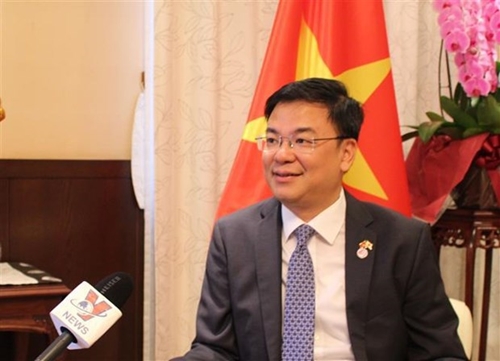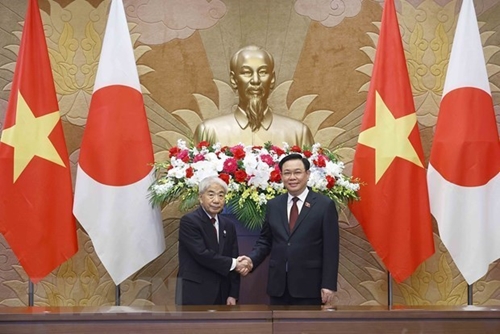Talking to the Vietnam News Agency, he said that over the last 50 years, the countries’ friendship and cooperation have been reinforced unceasingly and developed comprehensively in all aspects, becoming a bright spot in the implementation of Vietnam’s foreign policy of independence, self-reliance, and diversification and multilateralization of international relations.
    |
 |
|
Vietnamese Ambassador to Japan Pham Quang Hieu grants an interview to the Vietnam News Agency. |
Japan currently ranks first among providers of official development assistance (ODA), second among labor cooperation partners, third among foreign investors and tourism partners, and fourth among trading partners of Vietnam.
Japan has over 5,000 valid investment projects worth more than 70 billion USD in Vietnam, which, in turn, has invested about 19.5 million USD in 106 projects in the Northeast Asian nation. Meanwhile, bilateral trade has continued growing in a balanced manner, approximating 50 billion USD in 2022, statistics show.
Bilateral ties in politics, diplomacy, security, defense, economy, and education - training have been consolidated and become increasingly effective and substantive. Cultural exchanges, people-to-people links, and locality-to-localities connections have also been further enhanced, serving as important and solid stepping stones for bilateral relations.
Developing human resources is also an important pillar of their ties. There are nearly 500,000 Vietnamese people in Japan at present, making them the second largest foreign communities there and also an important source of manpower for many sectors in Japan, according to Hieu.
He said 50 years are not a long period in the nearly-1,300-year history of the countries’ connections but have witnessed the fast, breakthrough, and comprehensive development of bilateral cooperation and friendship. The two sides have become critically important partners of each other. Their relations have continually been upgraded over years, reaching the “extensive strategic partnership for peace and prosperity in Asia” in 2014.
    |
 |
|
Vietnamese National Assembly Chairman Vuong Dinh Hue (right) and President of the House of Councilors of Japan Otsuji Hidehisa at their meeting in Hanoi on September 5, 2023. |
The ambassador noted the countries have frequently held high-level mutual visits as well as meetings on the sidelines of international and regional conferences to strengthen their leaders’ mutual trust and outline major orientations for bilateral relations in all fields.
They have cooperated closely and effectively at international and regional forums like the United Nations, the ASEAN Plus meetings, the Asia-Pacific Economic Cooperation (APEC), and the Asia - Europe Meeting (ASEM), thereby actively contributing to peace, stability, and development in Asia-Pacific.
He perceived that the two economies are highly complementary to each other and still hold much cooperation potential, especially in the post-COVID-19 period.
To continue fostering bilateral relations, Vietnam and Japan should step up the implementation of high-level agreements, Hieu remarked, noting that first, they need to keep strengthening political trust by increasing all-level visits and engagements, especially at high levels.
In 2023, when the countries celebrate 50 years of their diplomatic ties, Vietnam needs to coordinate with Japan to bolster friendship and cooperation in all spheres and herald a new period of more substantive and effective development of relations.
Second, they need to capitalize on their economies’ complementary advantages, enhance economic connectivity, and maintain Japan as a leading partner of Vietnam in terms of ODA, investment, and trade.
Vietnam should continue calling for Japan’s provision of new-generation ODA for the development of strategic infrastructure, digital transformation, climate change response, and health care. It also needs to make use of Japanese firms’ attention to Vietnam during their supply chain diversification to attract high-quality investment from the Northeast Asian country and join supply chains of Japanese businesses.
Third, both sides should foster cooperation in potential areas such as digital transformation, digital economy, and green transition, the diplomat added.
Source: VNA